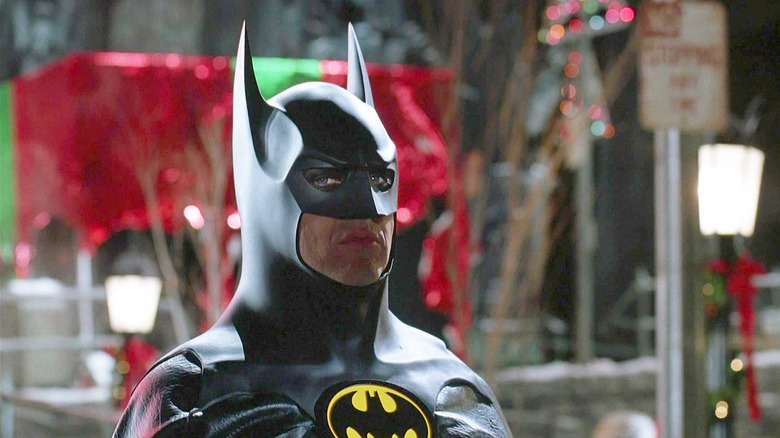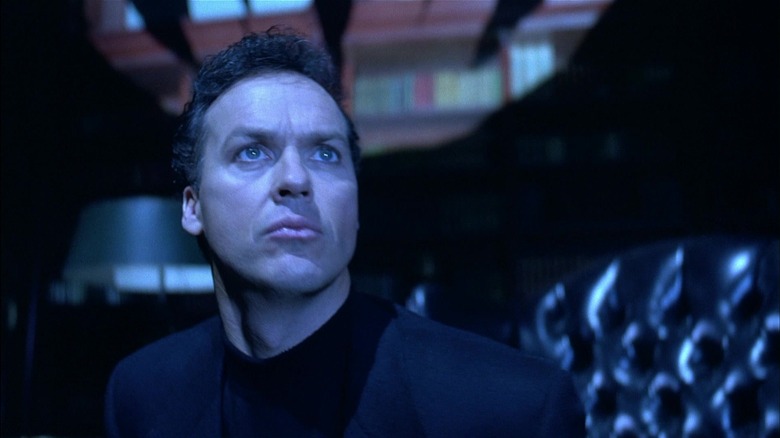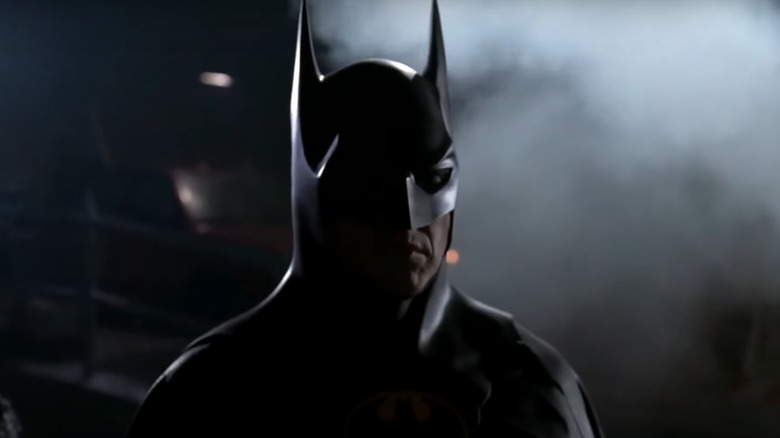Michael Keaton Cut More Than Half Of His Own Dialogue From Batman Returns
In recent years "Batman Returns" has been getting the recognition it always deserved, and honestly, it's about damn time. There'll always be a contingent of bat-fans who hate depictions of Batman killing, alongside those that feel "Returns" is too much of a Tim Burton movie and not enough of a Batman movie. But as the growing love shows, Burton's nightmare fairytale remains the most engrossing, haunting, and darkly beautiful Batman movie, dare I say even just movie, I've seen. Bo Welch's production design remains the best on-screen Gotham yet (closely followed by Anton Furst's industrial hellscape from 1989's "Batman"), making for an all-enveloping atmosphere that has stayed with me since I first saw the film on my parent's rented CRT. It's no wonder Burton remains proud of his "weird experiment" 30 years on.
But there's more to what makes the movie great than the beautifully crafted Gotham set, which was erected over at the Warner Bros. lot in Burbank just minutes from where Burton grew up. "Returns" has some of the zaniest and most strangely eloquent dialogue of any Batman film yet produced. Whether it's Danny Devito's Penguin telling Batman he's "touring the riot scene, gravely assessing the devastation" or the whole "mistletoe can be deadly if you eat it" interaction between Michael Keaton's Batman and Michelle Pfieffer's Catwoman, screenwriter Daniel Waters' writing is top-notch.
To balance out the more loquacious characters, Keaton's Dark Knight is comparatively terse, delivering some perfectly timed yet brief lines here and there but generally staying pretty silent. It's a choice that works so well within the context of the movie, both emphasizing the mysterious aura that surrounds Keaton's Batman and making room for Penguin and Max Shreck (Christopher Walken) to deliver their more elaborate lines. With that in mind, it's not surprising that the ever-tasteful Keaton had much to do with his character's conciseness.
The direct approach
Waters told The Hollywood Reporter on the movie's 30th anniversary that his original script actually included much more in terms of Batman and Bruce Wayne speeches. But the leading man told the screenwriter to cut most of it, having recognized the power of Batman's image. As he put it: "Once I realized how powerful the suit was in terms of an image on screen, I just used it."
A common complaint leveled at "Batman Returns" is that the central character gets sidelined in favor of showcasing the comparatively outlandish villains, which to some extent is true. But I always thought Keaton's quieter, more mysterious performance gave Batman an almost supernatural quality that worked well within the world Burton and Welch had constructed. In fact, it really felt as if the Batman of "Returns" was the truly "weird figure of the dark" that Bill Finger had described in Detective Comics #33 in 1939. It seems Waters agrees, with the writer saying that once he saw the film, he realized Keaton's choice to cut dialogue was the right decision.
'Trust the character will be there'
Keaton has spoken about stepping back into the rubber suit for the 1992 sequel, having played Batman three years prior. What was interesting to him about returning to the character was that, at first, he was trying to copy his performance from the 1989 movie, saying: "I found myself kind of doing an impersonation of myself." But that approach wasn't working, so Keaton simply decided to drop it and "open up like it's the first time and just trust that the character will be there."
That difference between Keaton's performances in the two movies is quite clear when rewatching them. Whereas the Batman of "Batman" seems like a gruffer, slightly more verbose hero, the Batman of "Returns" is a more laconic anti-hero who in his quiet broodiness and ease with which he hands out fatal punishments conveys a real sense of danger and suppressed anger. While many fans of the character balk at this more violent version, within Burton's gothic nightmare, it works. And while McDonald's evidently wasn't too pleased with the dark tone of the film, and the most boring kids you've ever seen decided to spearhead a backlash against it, I always found the whole thing genuinely spellbinding.
Keaton's Dark Knight didn't have to say much to convey a sense of imposing power when he was blowing up giant thugs with their own bombs and lighting circus freaks on fire. If that didn't get you fired up as a kid, you might have more in common with the corporate bores over at McDonald's than you'd like to admit.


